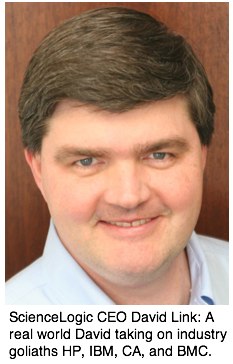Interop Insider #3 (MP3): ScienceLogic's David Takes On Goliaths BMC, CA, IBM, And HP
Based out of Reston, Va., ScienceLogic CEO David Link is no Silicon Valley insider. He might as well be, though, because the technology that ScienceLogic has cooked up in the form of it's 7-in-1 EM7 data center management appliance is the sort of solution that usually requires a patchwork of solutions from the management titans normally associated with such functionality: BMC, CA, IBM, and HP.

Based out of Reston, Va., ScienceLogic CEO David Link is no Silicon Valley insider. He might as well be, though, because the technology that ScienceLogic has cooked up in the form of it's 7-in-1 EM7 data center management appliance is the sort of solution that usually requires a patchwork of solutions from the management titans normally associated with such functionality: BMC, CA, IBM, and HP.
 In this, my third podcast episode of Interop Insider (Episode #1, Episode #2), Link and I chat about the company's EM7 appliance (which starts at $25,000), the history of the relatively young ScienceLogic (he founded it in 2003), and the company's role with respect to the InteropNET (the short-lived but nontheless complicated network that serves as the backbone to Interop which takes place in Las Vegas from May 17 to May 21 this year Register Here).
In this, my third podcast episode of Interop Insider (Episode #1, Episode #2), Link and I chat about the company's EM7 appliance (which starts at $25,000), the history of the relatively young ScienceLogic (he founded it in 2003), and the company's role with respect to the InteropNET (the short-lived but nontheless complicated network that serves as the backbone to Interop which takes place in Las Vegas from May 17 to May 21 this year Register Here).
To listen to my interview with David Link, click this play button or click here to grab the MP3 file so you can listen to it later.
The EM7 is a single appliance that, according to link, covers seven primary administrative and management functions that are normally associated with separate solutions from other providers (solutions that are often integrated after purchase). The EM7 is designed to cover ScienceLogic's customers for their needs in the area of network management, application management (particularly as it relates to the expected network behaviors of enterprise applications), systems management, and asset management.
OK, so that's only 4 of 7. To the extent that each of the four categories involves events that could require the intervention of IT personnel, one key feature of the EM7 is to aggregate those events into a single event stream that's consistently presented and therefore easier to manage (than separate event streams from separate management systes). So, this cross-discipline event handling is the EM7s fifth function and, to the extent that intervention to deal with events is required, the EM7's sixth major area of integrated functionality is a trouble-ticketing system (so, there's no need to go out and buy a separate one of those, either).
Finally, the last function, which is probably more useful to service providers than most IT shops, helps to keep track of service levels. This feature is particularly useful in situations where service level agreements (SLAs) require accurate reporting and transparency with respect to a service's availability and response times.
Although the technique isn't unique to ScienceLogic or its management applicances, the EM7 starts out by baselining the normal behavior of the networks and applications that it's assigned to monitoring. Once the thresholds are set, any network or application activity that exceeds those thresholds ultimately triggers a resolution. According to Link, should a problem self-heal or correct itself, the associated alerts are automatically withdrawn. Said Link:
If we go from error state to corrected state, you get a healthy notice that cancels the unhealthy state and a notification goes out to everyone basically calling off the troops.
Founded in 2003, ScienceLogic has about 40 employees. The company is privately held and running at an annual revenue rate of about $15 million per year with 100% year-over-year growth. Not surprisingly (given it's location), about 35% of the company's business comes from the U.S. government -- a door that Link says was opened when certain partners brought ScienceLogic into the government projects that they were working on. Link expects that he'll have 6 to 8 of ScienceLogic's appliances connected to the InteropNET in Las Vegas this May.
David Berlind is an editor-at-large with InformationWeek. David likes to write about emerging tech, new and social media, mobile tech, and things that go wrong. He can be reached at [email protected] and you can also find him on Twitter and other social networks (see the list below). David doesn't own any tech stocks. But, if he did, he'd probably buy some Salesforce.com and Amazon, given his belief in the principles of cloud computing and his hope that the stock market can't get much worse. Also, if you're an out-of-work IT professional or someone involved in the business of compliance, he wants to hear from you.
Twitter: (@dberlind)
My Facebook Page (Facebook should have a namespace like Twitter, FriendFeed, and the others)
Flickr (davidberlind)
YouTube (TechWebTV)
FriendFeed (davidberlind)
Del.icio.us (dberlind )
Me on LinkedIn (LinkedIn should have a namespace as well)
Plaxo (davidberlind)
Disqus (DavidBerlind)
About the Author
You May Also Like




